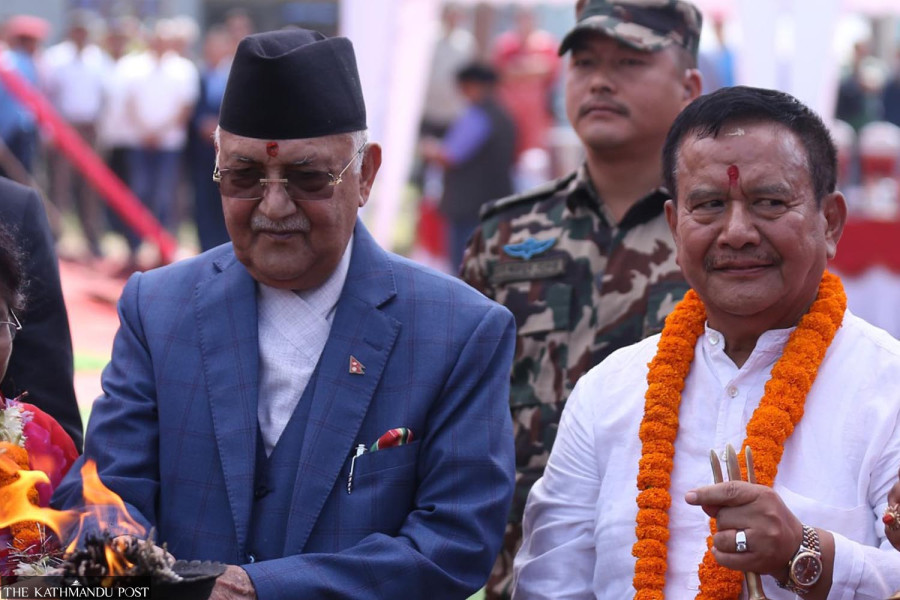Politics
UML under fire over Bhatbhateni owner’s ‘generous’ donations
Party leader warns taking such donations without broad consultations could prove disastrous for the ruling party.
Purushottam Poudel
The announcement by Min Bahadur Gurung, owner of the Bhatbhateni supermarket chain who was earlier jailed for misappropriating government property, to donate land and construct a building for the CPN-UML headquarters continues to stir controversy.
On October 11th, Prime Minister and UML Chair KP Sharma Oli, in the presence of the party’s leaders, laid the foundation for the UML central office at Maitrinagar in ward 2 of Kirtipur Municipality. Gurung donated 10 ropani and 14 ana of land (0.55 hectares) for the UML’s party office.
Not all UML leaders are satisfied with this decision, and a few have openly criticised the party chair’s decision to accept the donation.
When Post talked to some party leaders about Gurung’s donation, most declined to comment openly but in private they expressed discontent.
UML standing committee member Binda Pandey is one UML leader who has openly questioned the party’s decision to accept donations from the businessman. She has also argued that doing so would insult the 2.8 million voters and more than 550,000 party members.
“It is wrong for a political party to accept such donations for building its party office, and it is equally wrong for a businessperson to offer such donations,” Pandey wrote on her social media. “The giving side might better know why and how they are offering such donation, but when it comes to the party, accepting such assistance, without informing discussing or deciding at the leadership level and without informing the party, could prove suicidal in the long run.”
She also has urged the party leadership to reconsider the decision.
However, Rajendra Gautam, the head of the party’s publicity department, said the party secretariat had decided to accept Gurung’s proposed donation of land for the party office, with Gurung himself covering construction costs.
“Some of our party leaders may have been unaware of the party secretariat’s decision,” Gautam told the Post. “There is no harm in accepting a donation offered without bargaining.”
The decision further aggravates public disenchantment with political parties and their leadership, say political experts, who also see a conflict of interest.
They have raised concerns about how a party like the UML, currently in the government, can accept a donation from a businessman, whose case is still sub judice in court.
But Gautam, the UML publicity department head, dismisses these concerns.
“Until the court gives its final verdict, no one can be labelled a culprit,” Gautam said.
In February last year, Gurung was sentenced to two years in prison for his involvement in the Lalita Niwas land case. He was also fined more than Rs8 million rupees.
The Commission for the Investigation of Abuse of Authority also found that Gurung had made financial investments to acquire government land at Lalita Niwas, initially in someone else’s name and later in his own.
A case was registered against 310 people for the embezzlement of 143 ropani of land (7.27 hectares) at Lalita Niwas. Gurung was arrested by the Central Investigation Bureau (CIB) of Nepal Police, accusing him of being the main planner of the scheme.
At a public event, Oli accused the government of harboring malice toward Gurung.
Gurung was released on bail from the land scam case in September of the same year. However, the CIB detained him again on charges of forging government documents, but he was again released soon.
If such an incident, when political parties received donations from businessmen had occurred in any other civilised country, the party accepting the donation would have faced severe political consequences, says Keshav Dahal, a political expert.
“When corruption becomes routine, political leaders cannot differentiate right from wrong,” Dahal told the Post. “The UML’s acceptance of Gurung’s donation is a form of corruption.”
During the foundation stone-laying ceremony, Gurung told the media that is closely associated with the UML. Therefore, Gautam argues there was nothing wrong with accepting the donation from someone closely associated with the party.
“Until and unless our party distorts the law of the land to favour Gurung’s business interests, there is no harm in accepting the donation,” Gautam reiterated.
However, for political economists, a businessman donating to the ruling party in a country without specific laws raises moral concerns and presents a clear conflict of interest. To them, this incident is also indicative of the country’s unfair marketplace, where businessmen with political ties can do business on more favourable terms.
“This is against the principles of a fair market economy,” political economist Bhim Bhurtel told the Post. “When the prime minister's name is linked to a businessman, that businessman will definitely receive direct or indirect benefits from state agencies, which will compel other businessmen to extend similar favours.”
When one of the country’s biggest retailers has a nexus with the executive head of the state, state agencies may not be able to regulate that business, says Bhurtel.
“This could also affect the price and quality of products sold by the retailer,” he added.




 10.12°C Kathmandu
10.12°C Kathmandu















